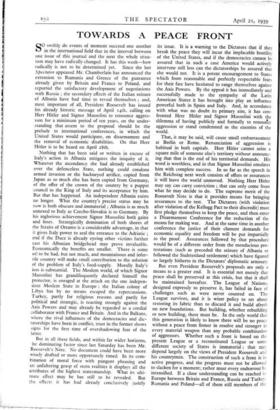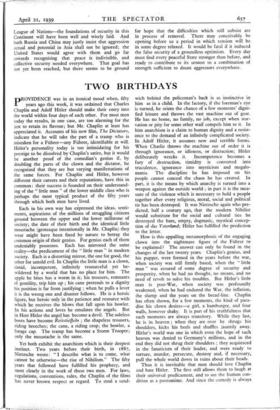TOWARDS A PEACE FRONT S 0 swiftly do events of moment
succeed one another in the international field that in the interval between one issue of this journal and the next the whole situa- tion may have radically changed. It has this week—how radically is not to be determined yet. Since the last Spectator appeared Mr. Chamberlain has announced the extension to Rumania and Greece of the guarantee already given by Britain and France to Poland, and reported the satisfactory development of negotiations with Russia ; the secondary effects of the Italian seizure of Albania have had time to reveal themselves ; and, most important of all, President Roosevelt has issued his already historic message of April i4th, calling on Herr Hitler and Signor Mussolini to renounce aggres- sion for a minimum period of ten years, on the under- standing that assent to the proposal should be the prelude to international conferences, in which the United States would participate, on disarmament and the removal of economic disabilities. On that Herr Hitler is to be heard on April 28th.
Nothing that has been said or written in excuse of Italy's action in Albania mitigates the iniquity of it. Whatever the ascendancy she had already established over the defenceless State, nothing could condone armed invasion or the hackneyed artifice, copied from Japan as so much else has been copied from Germany, of the offer of the crown of the country by a puppet council to the King of Italy and its acceptance by him. But that has happened. An independent Albania exists no longer. What the country's precise status may be now is both obscure and immaterial ; Albania is as much annexed to Italy as Czecho-Slovakia is to Germany. By his inglorious achievement Signor Mussolini both gains and loses. Strategically domination of both shores of the Straits of Otranto is a considerable advantage, in that it gives Italy power to seal the entrance to the Adriatic ; and if the Duce is already eyeing other victims farther east his Albanian bridgehead may prove invaluable. Economically the benefits are smaller. There is some oil to be had, but not much, and mountainous and infer- tile country will make small contribution to the solution of the problem of Italy's food-supply. Morally Italy's loss is substantial. The Moslem world, of which Signor Mussolini has grandiloquently declared himself the protector, is enraged at the attack on the one indepen- dent Moslem State in Europe ; the Italian colony of Libya has by no means escaped the repercussions. Turkey, partly for religious reasons and partly for political and strategic, is reacting strongly against the Axis Powers and may already be regarded as a cordial collaborator with France and Britain. And in the Balkans, where the rival influences of the democracies and dic- tatorships have been in conflict, trust in the former shows signs for the first time of overshadowing fear of the latter.
But in all these fields, and within far wider horizons, the dominating factor since last Saturday has been Mr.
Roosevelt's Note. No document could have been more wisely drafted or more opportunely timed. In its com- bination of moral force with pungent phrasing and an unfaltering grasp of stern realities it displays all the attributes of the highest statesmanship. What its ulti- mate effect may be has still to be revealed. But the effects it has had already conclusively justify its issue. It is a warning to the Dictators that if they break the peace they will incur the implacable hostility of the United States, and if the democracies cannot be assured that in such a case America would actively intervene still less can the dictatorships be assured that she would not. It is a potent encouragement to States which from reasonable and perfectly respectable fears for their fate have hesitated to range themselves against the Axis Powers. By the appeal it has immediately and successfully made to the sympathy of the Latin American States it has brought into play an influence powerful both in Spain and Italy. And, in accordance with what was no doubt its primary aim, it has con- fronted Herr Hitler and Signor Mussolini with the dilemma of having publicly and formally to renoutice aggression or stand condemned as the enemies of the world.
That, it may be said, will cause small embarrassment at Berlin or Rome. Renunciation of aggression is habitual in both capitals. Herr Hitler cannot seize a square mile of someone else's territory without announc- ing that that is the end of his territorial demands. His word is worthless, and in that Signor Mussolini emulates him with complete success. In so far as the speech in the Reichstag next week consists of offers or assurances it will leave the world unmoved. Nothing Herr Hitler may say can carry conviction ; that can only come from what he may decide to do. The supreme merit of the Roosevelt Note is that it provides means for bringing assurances to the test. The Dictators (with violation after violation of the Kellogg Pact to their discredit) must first pledge themselves to keep the peace, and then enter a Disarmament Conference for the reduction of the means for making war. And at the same time in another conference the justice of their clamant demands for economic equality and freedom will be put impartially to the proof. Assurances followed by that procedure would be of a different order from the mendacious pro- testations (such as preceded the seizure of Albania or followed the Sudetenland settlement) which have figured so largely hitherto in the Dictators' diplomatic armoury.
But even President Roosevelt's proposals are only a means to a greater end. It is essential not merely that peace shall be preserved at this crisis, but that it shall be maintained hereafter. The League of Nations, designed expressly to preserve it, has failed in face of challenges such as were never counted on. The League survives, and it is wiser policy to set about restoring its fabric than to discard it and build afresh on new foundations. But building, whether rebuilding or new building, there must be. In the only world that this generation is likely to know there will be no peace without a peace front firmer in resolve and stronger in every material weapon than any probable combination of aggressors. Whether such a front is based on the present League or a reconstituted League or some different society of States is immaterial ; that may depend largely on the views of President Roosevelt and his countrymen. The construction of such a front is in active progress, and the progress must not be allowed to slacken for a moment; rather must every endeavour be intensified. If a close understanding can be reached in Europe between Britain and France, Russia and Turkey. Rumania and Poland—all of them still members of the League of Nations—the foundations of security in this Continent will have been well and wisely laid. And both Russia and China may justly insist that aggression actual and potential in Asia shall not be ignored; the United States would agree with them and go far towards recognising that peace is indivisible, and collective security needed everywhere. That goal has not yet been reached, but there seems to be ground for hope that the difficulties which still subsist are in process of removal. There may conceivably be opening before us a period in which tension will be in some degree relaxed. It would be fatal if it induced the false security of a groundless optimism. Every day must find every peaceful State stronger than before, and ready to contribute to its utmost to a combination of strength sufficient to daunt aggressors everywhere.











































 Previous page
Previous page